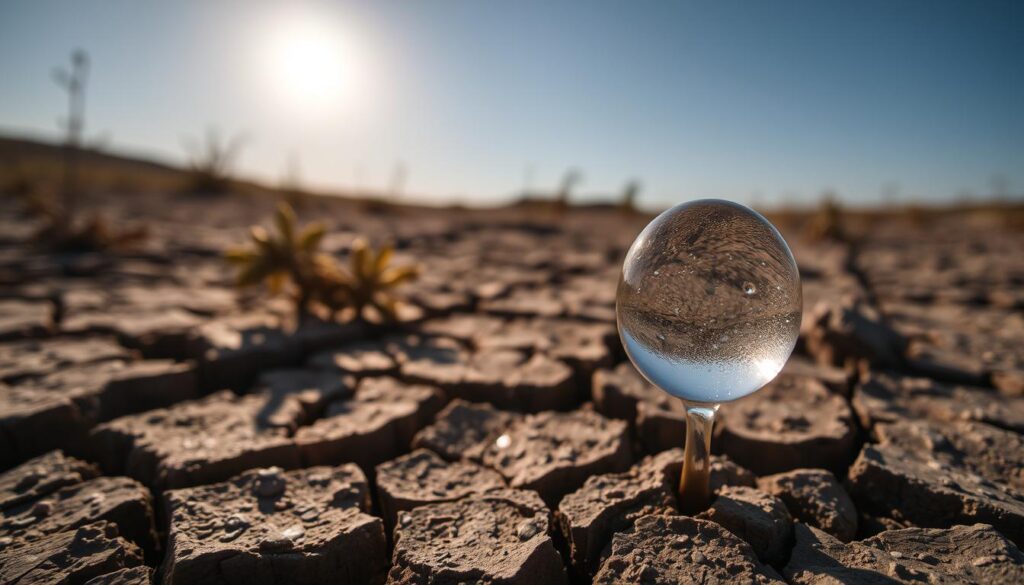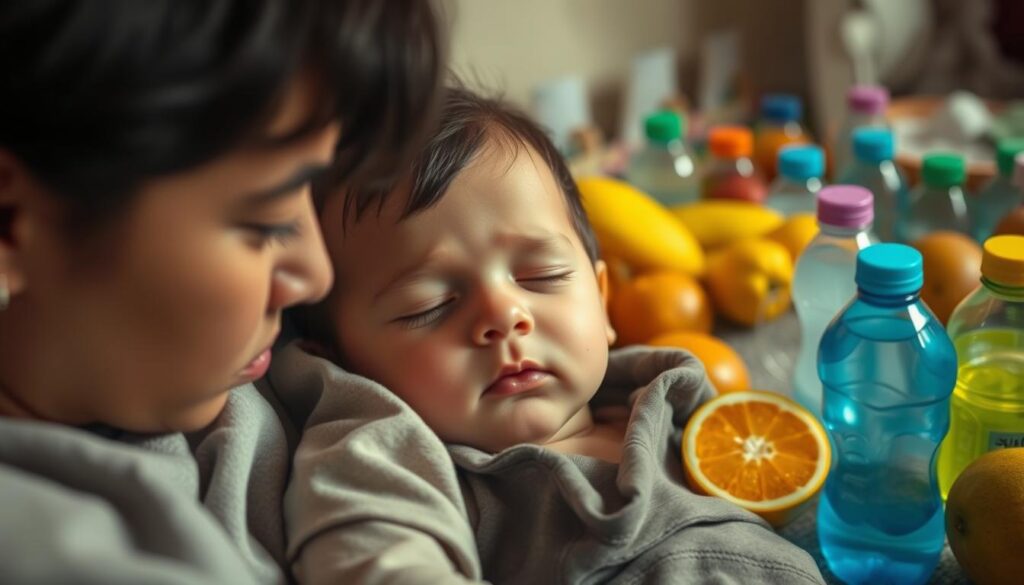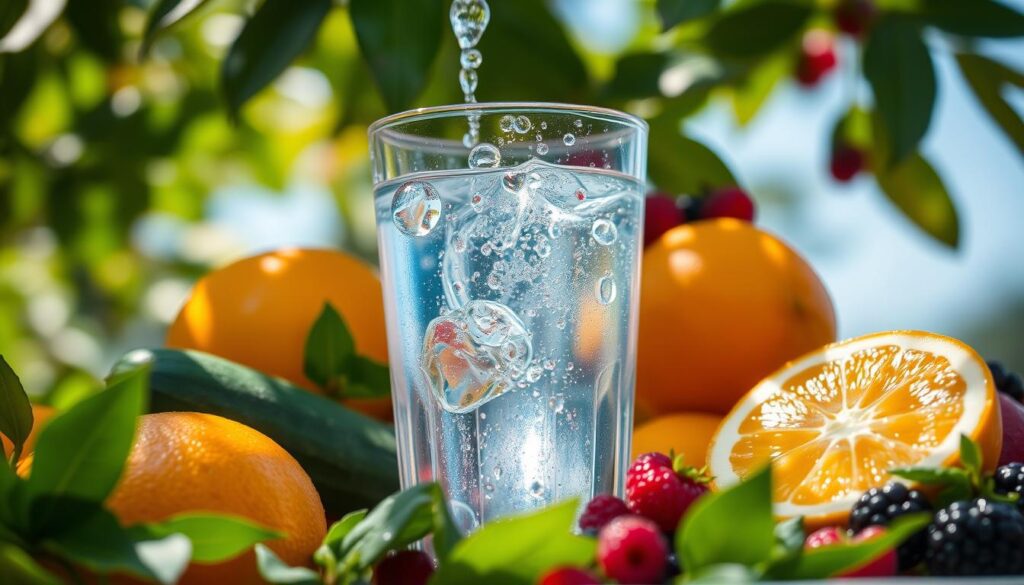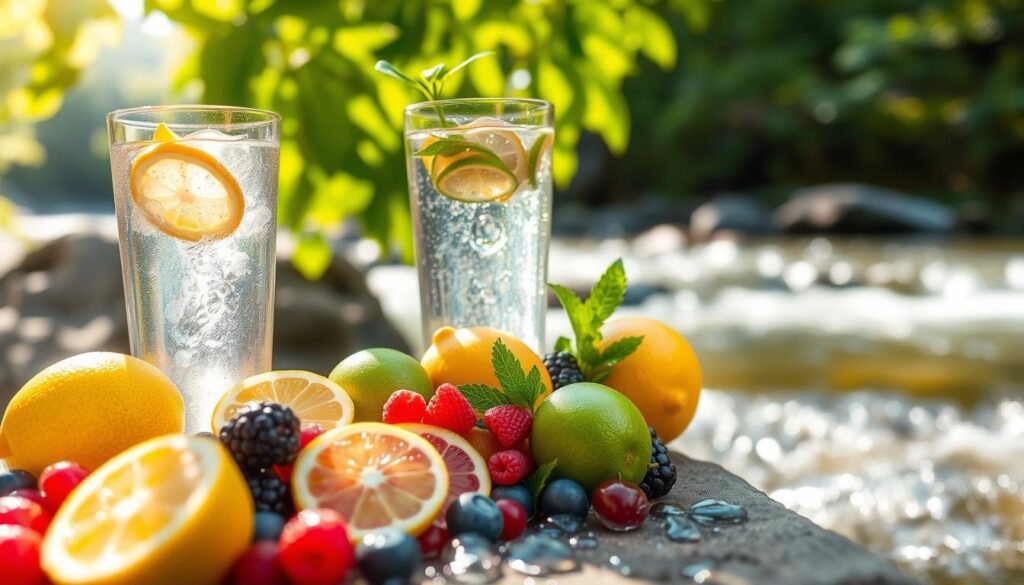
Please note: This website contains affiliate links. As an Amazon Associate, we earn from qualifying purchases at no additional cost to you.
Did you know losing 3% to 5% of your body weight in fluids can cause mild dehydration1? This small amount can really affect how well your body works. Dehydration is a big problem for people of all ages, from kids to seniors. It can lead to serious issues if not treated.
Dehydration happens when your body doesn’t have enough fluids. It can be caused by sweating too much, having diarrhea or vomiting, or not drinking enough water, especially in hot or dry places2. Knowing the signs of dehydration and rehydrating can stop serious problems like heat exhaustion, kidney issues, and even organ failure.
We will cover:
- What exactly is dehydration?
- Signs and symptoms (and what to look for in children)
- How to treat dehydration
- How to prevent getting dehydrated in the future
What is Dehydration?
Dehydration happens when your body loses more fluids than it takes in3. It can occur due to sweating too much, having diarrhea, vomiting, or fever3. Diabetes and other health issues can also raise your risk3. The severity of dehydration depends on how much fluid is lost4.
Causes of Dehydration
Several factors can lead to dehydration:
- Excessive sweating, like during exercise or in hot weather3
- Diarrhea, vomiting, or fever3
- Diabetes or other conditions that make you urinate more3
- Drinking too much alcohol5
- Medications, like diuretics, that cause fluid loss5
- Not drinking enough water5
Dehydration can hit fast, especially in babies, kids, and seniors3. It’s key to drink plenty of water, especially when losing fluids or in dry places5.
| Mild to Moderate Dehydration | Severe Dehydration |
|---|---|
|
Signs and Symptoms of Dehydration
Mild to Moderate Dehydration
Dehydration happens when your body loses more water than it takes in6. It can show up in different ways, from mild to severe. You might feel thirsty, have a dry mouth, or notice dark yellow urine6.
Headaches and muscle cramps are also signs of mild dehydration6. If dehydration gets worse, you could feel dizzy, have a fast heartbeat, and your eyes might look sunken6.
Older adults might not feel thirsty as much, so they might not drink enough7. Kids and babies can get dehydrated quickly, especially if they have diarrhea or vomit7. People with long-term illnesses like diabetes or kidney problems are also at risk7.
Adults might notice they’re very thirsty, have a dry mouth, and dark urine7. Babies and young kids might have dry mouths, not wet diapers for hours, and sunken eyes7.

Severe dehydration can be very dangerous, causing confusion, fainting, and rapid heartbeat7. For mild dehydration, drinking water usually helps. But severe cases might need hospital treatment with intravenous fluids7.
To avoid dehydration, drink enough water every day7. Stay away from sugary and caffeinated drinks7. Drink more water in hot weather or when you’re sick76.
Signs that You Are Dehydrated
Dehydration can sneak up on you. It’s key to know the signs you’re not drinking enough water. Feeling thirsty, having a dry mouth or tongue, and urinating less with darker yellow urine are common signs8.
Other symptoms include feeling tired, dizzy, having headaches, and muscle cramps8. If you notice these signs, drinking more water can help rehydrate your body9.
The amount of water you need varies. It depends on your age, how active you are, and your health9. People with heart, kidney, or diabetes issues are more at risk8. Also, kids under two and adults over 50 are more likely to get dehydrated8.
| Symptom | Mild Dehydration | Severe Dehydration |
|---|---|---|
| Thirst | Increased thirst | Intense thirst |
| Urine | Decreased urine output, dark yellow urine | Little to no urine output, extremely dark yellow or amber urine |
| Skin | Dry, inelastic skin | Shriveled, wrinkled skin |
| Other Symptoms | Fatigue, dizziness, headaches, muscle cramps | Confusion, delirium, unconsciousness, organ failure |
If you’re not sure if you’re dehydrated, see a healthcare professional. They can give you advice tailored to your needs and help you stay hydrated89.
Dehydration in Children and Infants
Dehydration is a big worry for kids and babies. Their bodies are mostly water, which helps keep them cool, get rid of toxins, and keep their joints and tissues healthy10. Kids under six months are more likely to get dehydrated than adults11.
Vomiting, diarrhea, or both can cause dehydration in kids12. They might not want to drink because of mouth sores, a sore throat, or being too active12. Illnesses like sore throats or high fever can also lead to dehydration11.
Signs of dehydration in kids include a dry mouth, sunken eyes, and fewer tears when crying12. Babies might have a sunken soft spot on their head10. Severe dehydration can cause seizures, brain damage, or even death10.
Treating dehydration depends on how bad it is. Mild cases can be treated at home with Pedialyte. But, severe cases might need a hospital stay12. Older kids can have electrolyte ice pops, but babies should only have Pedialyte12. Avoid sports drinks, full-strength juice, and soda because they have too much sugar10.
If a child won’t drink for hours, is under a year, only drinks Pedialyte for 24 hours, vomits a lot, or has abnormal vomit, see a doctor12. If they are very tired or unresponsive, go to the emergency room12.
To stop dehydration, make sure kids drink enough when they’re sick. Give them small sips of fluids if they’re vomiting. Encourage them to drink more in hot weather and during sports12. Drinking enough water every day can also help prevent dehydration11.

| Mild to Moderate Dehydration | Severe Dehydration |
|---|---|
|
|
“Mild dehydration, if not addressed, can progress to severe dehydration, which can be life-threatening.”10
Who is at Risk for Dehydration?
Some groups face a higher risk of dehydration. Women should drink about 2.7 liters (92 fluid ounces or 11.5 cups) daily. Men need 3.7 liters (124 fluid ounces or 15.5 cups) each day13. Babies, young kids, and older adults are more at risk. So are those with chronic health issues like diabetes6.
Older adults might not feel thirsty as much and drink less. Infants and young children are more likely to get dehydrated from diarrhea or vomiting7.
People who are active in hot weather, like athletes, are also at risk. They lose a lot of heat through sweating13. Those on certain medications that make you urinate or sweat more are also at risk7.
Knowing who is at risk can help us stay hydrated. It’s important to drink enough water to avoid dehydration.
Severe dehydration symptoms need immediate medical help. These include confusion, fainting, and not urinating. Other signs are rapid heartbeat, breathing, and shock7.
Untreated dehydration can cause serious problems. These include heat cramps, seizures, low blood pressure, and even coma13.
To prevent dehydration, drink enough water. Avoid sugary and caffeinated drinks. Drink more water in hot weather or when active. Also, stay hydrated when sick by drinking small amounts of water or ice chips7.
Treating Dehydration
Mild Dehydration
For mild dehydration, you need to replace lost fluids and electrolytes. Drinking water, electrolyte-rich drinks, or oral rehydration solutions can help. About 60% of our bodies are water. Symptoms include dry mouth, feeling tired, and dizzy14.
Dehydration can happen from not drinking enough, diarrhea, vomiting, and sweating14. To rehydrate, choose the right drinks. Water, clear broths, frozen water, sports drinks, and fruit juices work well14. Avoid alcohol, sugary drinks, coffee, and caffeine when dehydrated14.
Oral rehydration solutions are great for replacing lost sugars and salts6. If you have severe symptoms like dizziness, rapid heartbeat, or confusion, get medical help14. For severe dehydration, you might need IV fluids14. But, drinking too much water too fast can cause problems like pulmonary edema or peripheral edema6.

Infants and children should drink diluted squash or oral rehydration solutions, not just water6. Athletes, people at high altitudes, older adults, and those with chronic illnesses are at higher risk14.
| Mild Dehydration Symptoms | Severe Dehydration Symptoms |
|---|---|
| Dry mouth, lethargy, dizziness | Dizziness, rapid heartbeat, confusion |
| Darker urine, headaches, constipation | Low blood volume, seizures, kidney problems |
An adult male needs about 3 liters of water daily, while a female needs about 2.2 liters14. Severe dehydration can lead to serious issues like low blood volume, seizures, and kidney problems14.
“Staying hydrated is crucial for maintaining overall health and well-being. Paying attention to the signs of dehydration and taking prompt action can help prevent serious complications.”
Preventing Dehydration
Staying hydrated is key to avoid dehydration’s bad effects. Simple steps in your daily life can help keep you hydrated15.
Drinking enough fluids is crucial. Adults should drink about 64 ounces a day, or half a gallon15. Carry a water bottle and sip it often. Choose water over sugary drinks and add natural flavors to make it tastier15.
Eating foods with lots of water can also help. Watermelon, with about 92% water, is a great choice15. Adjust your water intake based on your activity, medication, and the weather15.
Drink more water when you’re at risk of dehydration, like when exercising or in the heat15. These easy steps can help you stay hydrated and healthy15.

Dehydration’s signs can be hard to spot. Stay alert and keep yourself and others hydrated. This way, you’ll stay healthy and full of energy, even when it’s tough162.
| Preventive Measure | Description |
|---|---|
| Carry a water bottle | Having a water bottle on hand serves as a constant reminder to stay hydrated throughout the day. |
| Choose water over sugary drinks | Opting for water over sodas, juices, and other sugary beverages can significantly reduce your risk of dehydration. |
| Add natural flavors to water | Infusing your water with fruits, herbs, or citrus can make it more appealing to drink and encourage increased fluid intake. |
| Consume water-rich foods | Incorporating hydrating fruits and vegetables, such as watermelon, into your diet can contribute to your overall fluid balance. |
| Adjust fluid intake for activity and environment | Increasing your fluid intake during exercise, hot weather, or when experiencing illness can help prevent dehydration. |
“Dehydration can have serious consequences, especially for vulnerable populations like children and older adults. Staying vigilant about hydration is the best way to avoid these risks.”
By following these tips and staying hydrated, you can avoid dehydration and stay healthy. Small steps towards hydration can greatly improve your health162.
Remember, the key to preventing dehydration is to drink enough fluids and pay attention to your body’s needs. By incorporating these simple habits into your daily routine, you can maintain optimal hydration and avoid the unpleasant and potentially dangerous effects of dehydration.
Conclusion
Dehydration is a serious issue that needs quick action and the right care. Knowing the signs, like thirst and dry mouth, helps prevent and treat it17. Keeping our bodies hydrated is key for health, as we are mostly water and need the right amount to work well17.
Mild dehydration can often be fixed by drinking more water. But severe dehydration can cause serious problems, like shock and kidney damage17. If you have severe symptoms, it’s important to see a doctor right away18. Taking steps to avoid dehydration, like drinking more water in hot weather, helps keep us safe17.
Understanding dehydration helps us stay healthy. Drinking enough water, knowing the signs, and getting help when needed are important. These steps help us manage dehydration and keep our bodies in top shape.
Please note: This website contains affiliate links. As an Amazon Associate, we earn from qualifying purchases at no additional cost to you.













